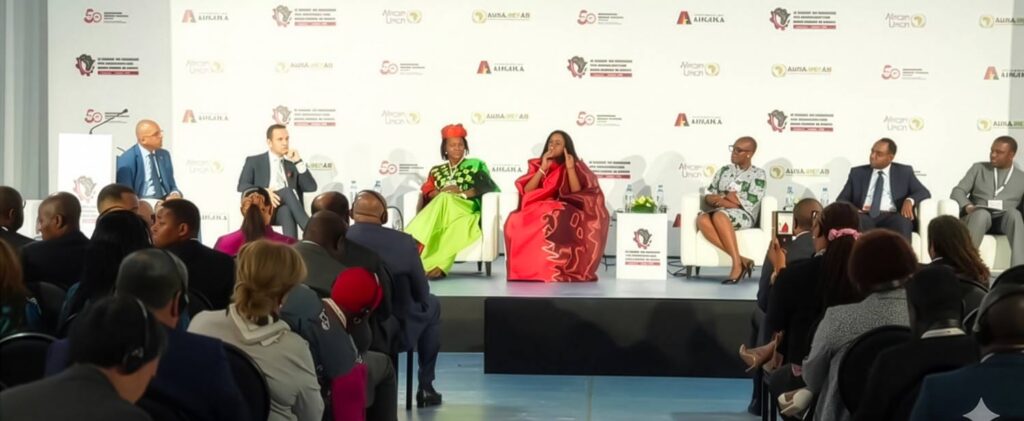The African Development Bank Group (AfDB) has reaffirmed its unwavering commitment to advancing a connected, industrialised, and inclusive Africa by enabling investments in infrastructure and regional integration, and by supporting more effective policy-making. This pledge was made by Joy Kategekwa, Director of the Bank Group’s Regional Integration Coordination Office, at the third Luanda Financing Summit for Africa’s Infrastructure Development.The summit took place in the Angolan capital from 28 – 31 October 2025, under the theme “Capital, Corridors, Trade: Investing in Infrastructure for the AfCFTA and Shared Prosperity.” It brought together policymakers, development partners, and private sector leaders to explore how infrastructure can unlock Africa’s industrial potential under the African Continental Free Trade Area (AfCFTA).Dignitaries in attendance included H.E. João Lourenço, President of the Republic of Angola; Kamel Abdel Hady Farag Al-Wazir, Minister of Transport of Egypt; Rui Miguêns de Oliveira, Minister of Economy and Planning of Angola; as well as senior representatives of the African Union Development Agency (AUDA-NEPAD).

Corridors as Catalysts: The Lobito Corridor VisionAt a session on the Lobito Corridor – a commercial route stretching across three countries, connecting landlocked Zambia and the Democratic Republic of Congo (DRC) to Angola’s Atlantic coast – Kategekwa described it as a prime example of the AfCFTA in action. “The Lobito Corridor teaches us new ways to design trade corridors by looking beyond the backbone of transportation and focusing on integrating agriculture, manufacturing, logistics, and services value chains,” she said.She stressed that infrastructure by itself is insufficient; for corridors like Lobito to deliver real transformation, they must be supported by strong governance, inclusive participation, and financing mechanisms that attract private capital. “[Infrastructure] is not self-executing. We must ensure institutional frameworks activate the intended outcomes that people, governance, and finance move together to realize Africa’s industrial dream.”
Financing Africa’s Industrial Leap: The PAIDA AgendaAt a High-Level Dialogue on Industrial Financing for the Programme for Accelerated Industrialisation Development in Africa (PAIDA), Kategekwa called for the alignment of manufacturing and production systems with regional market opportunities.“As tariffs are removed under the AfCFTA, we must ask ourselves: what regional value chains are we building, and where do African businesses fit in?” she said, adding that sectors such as automobiles, lithium-ion batteries, leather, textiles, soya, and cocoa are ripe for regional cooperation and value addition.The session concluded with renewed commitments to finance Africa’s industrial growth through special economic zones, green industrial facilities, and export facilitation platforms. A new PAIDA Investment Dialogue Platform was launched to track partnerships and progress.
Corridors and Integration: Engines of Shared ProsperityDirector Kategekwa told the audience at a session on “Regional Corridors and Africa’s Integration Agenda” that the continent’s transformation depends on efficient regional corridors that leverage infrastructure and policy to connect production hubs to markets.She noted that high logistics costs, inefficient border procedures, and unreliable energy continue to hinder competitiveness and exclude small businesses from cross-border trade. “Holistic corridor development offers a solution – one that lowers trade costs, expands value chains, and promotes inclusive, climate-smart growth,” she said.The African Development Bank Group’s approach integrates transport, energy, and digital connectivity with trade facilitation and enterprise support, ensuring that corridors become engines of integration and prosperity.
A Strategic Call: Link Capital, Corridors, and TradeKategekwa’s message in Luanda was clear and emphatic: Africa’s path to transformation must be built on integration, value addition, and inclusivity. “What enters the AfCFTA door must be goods and services made in Africa,” she concluded. “That is how we turn trade corridors into engines of industrialization and deliver shared prosperity for all Africans.”The bank Group delegation to the summit included Pietro Toigo, Country Manager for Angola, and Joel Daniel Muzima, Country Economist for Angola. Mike Salawou, Director, Infrastructure Cities and Urban Development participated virtually.